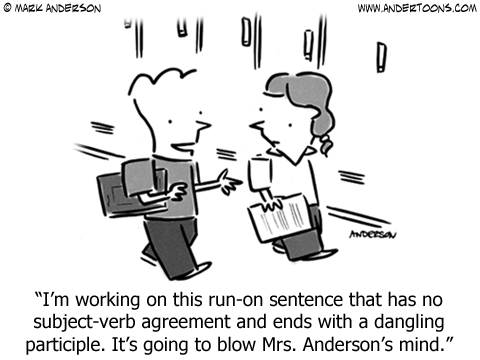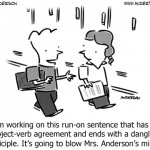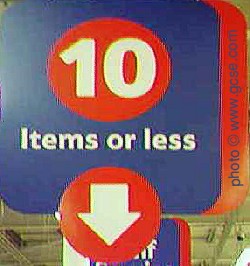
5 Grammar Conundrums Clarified
 5 Grammar Conundrums Clarified
5 Grammar Conundrums Clarified
Originally published by J.C. Martin
This post is brought to you by Grammarly. ![]()
I used Grammarly to grammar check this post, because it wouldn’t do to have a post on grammar containing grammatical errors now, would it? ![]()
“Me and George” or “George and I”? “If I were” or “if I was”? Today, I’m hoping to help clear up 5 common grammar conundrums.
1. George and me / George and I
In any case, “George” will always come first (i.e. it is never “me and George”).
To understand this conundrum, it is useful to go back to basics and to remember when we use the pronouns “I” and “me”.
“I” is used when referring to the subject of the sentence or clause, e.g. “I went to the beach.”
“Me” is used when referring to the object of the sentence or clause, e.g. “Dad took me to the beach.“
Bearing this in mind, the same is true when you add George to the picture:
Thanks to Baby Martin, I’ve been watching a lot of “Peppa Pig” recently…
If George is the subject, you use “I”, as in “George and I went to the beach.”
If George is the object, then you use “me”: “Dad took George and me to the beach.”
Here’s a simple way to remember which to use:
Take the other person/pronoun out of the sentence and see if the sentence still reads right.
For example, which of these are correct?
“George and I went to the beach” or “George and me went to the beach“?
Get rid of “George” and see:
“I went to the beach” or “Me went to the beach“?
Similarly:
“Dad took George and I to the beach” or “Dad took George and me to the beach“?
Which is right after you take George away?
“Dad took I to the beach” or “Dad took me to the beach“?
See what I mean?
2. If I were / If I was

“‘If I were’ or ‘if I was’? Was I President?”
Consider this:
“If I were President, I’d reform the gun laws.” CORRECT!
This means that I have specific plans on what to do should I ever be President. The phrase is known as a subjunctive mood.
“If I was President, I’d reform the gun laws.” UM … TECHNICALLY INCORRECT, BUT…
In this case, the phrase is used as a simple past tense. While this is grammatically incorrect — is the speaker uncertain if he/she used to be President? — it has become a widely accepted colloquial use of the phrase, especially in the UK.
3. Toward / Towards
Guess what? They’re both right! There is a tendency to omit the ‘s’ in America, but British publications tend to include it.
The same is true with forward/forwards and backward/backwards.
4. Fewer / Less
 This is a bit of a personal bugbear. It gets me every time I see the “10 items or less” checkout counters in supermarkets.
This is a bit of a personal bugbear. It gets me every time I see the “10 items or less” checkout counters in supermarkets.
Before we get into which to use, let’s introduce the count nouns and the mass nouns.
A count noun is something you can count that has a plural, e.g. “pen/pens”, “octopus/octopuses” (or “octopi”? That’s a post all of its own!).
A mass noun is something that can’t be counted that has no plural, e.g. “rain”, “water”.
When referring to count nouns, we use “fewer”. Hence the signs at the supermarket checkouts should really say “10 items or fewer“.
When referring to mass nouns, we use “less”, e.g. “We’ve been having less rain lately.”
Note that collective words like “furniture” and “stationery” are mass nouns (they have no plural), so we would say “less furniture” instead of “fewer furniture”.
But…
There is an exception. For measurements such as time, distance, and weight, it is customary to use “less” even though they are count nouns, e.g. “I’m delighted I weigh less today compared to last week.”
5. That / Which
This is a tricky one, since many people tend to use both words interchangeably. To understand when to use which, we must first explore the restrictive and non-restrictive relative clauses.
A restrictive relative clause is a phrase containing essential information about the noun in the sentence. Leaving out this clause will affect the meaning and/or structure of the sentence. To introduce a restrictive relative clause, we use “that”.
e.g. “He rubbed the hand that he accidentally hit with the hammer.”
Note that after removing the underlined clause, “He rubbed the hand” doesn’t really tell you much about why he’s rubbing his hand.
A non-restrictive relative clause, on the other hand, contains extra information. Leaving out this clause will not affect the meaning or structure of the sentence. In this case, we precede the clause with “which”.
e.g. “He rubbed his injured hand, which he accidentally hit with the hammer.”
Removing the underlined clause does not affect the meaning of the sentence. “He rubbed his injured hand” still makes a perfectly understandable sentence.
Also note that non-restrictive clauses are also preceded by a comma (this also helps you see that the sentence before the comma should make sense on its own). No commas are required for restrictive clauses.
Here’s another example:
“I got a new puppy, which I adopted from the pound.” [non-restrictive]
“My new puppy was the one that I adopted from the pound.” [restrictive]
Did this help clear up some of your grammatical uncertainties? Are there any other conundrums that should be clarified?
